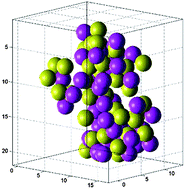Colloidal gelation of oppositely charged particles†
Abstract
Colloidal

* Corresponding authors
a
Department of Physics, Harvard University, 17 Oxford St., Cambridge, MA 02138, USA
E-mail:
weitz@seas.harvard.edu
b Laboratory of Physical Chemistry and Colloid Science, Wageningen University, Dreijenplein 6, Wageningen, The Netherlands
c School of Engineering and Applied Science, Harvard University, 29 Oxford St., Cambridge, MA 02138, USA
Colloidal

 Please wait while we load your content...
Something went wrong. Try again?
Please wait while we load your content...
Something went wrong. Try again?
E. R. Russell, J. Sprakel, T. E. Kodger and D. A. Weitz, Soft Matter, 2012, 8, 8697 DOI: 10.1039/C2SM25901J
To request permission to reproduce material from this article, please go to the Copyright Clearance Center request page.
If you are an author contributing to an RSC publication, you do not need to request permission provided correct acknowledgement is given.
If you are the author of this article, you do not need to request permission to reproduce figures and diagrams provided correct acknowledgement is given. If you want to reproduce the whole article in a third-party publication (excluding your thesis/dissertation for which permission is not required) please go to the Copyright Clearance Center request page.
Read more about how to correctly acknowledge RSC content.
 Fetching data from CrossRef.
Fetching data from CrossRef.
This may take some time to load.
Loading related content
